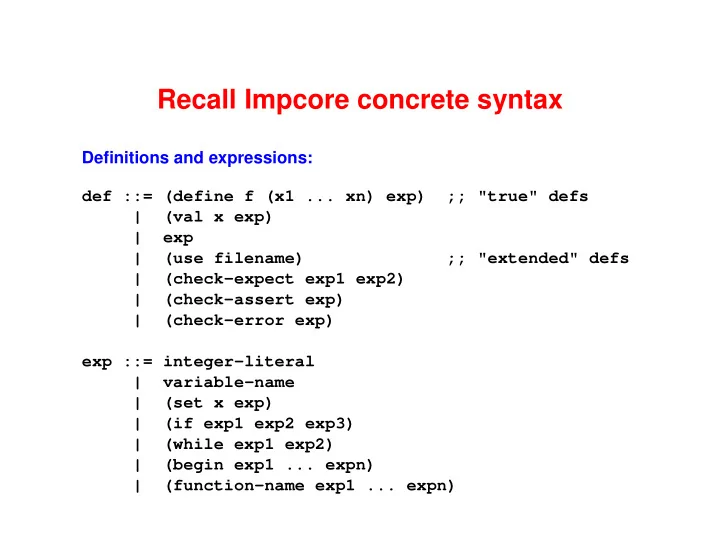

Recall Impcore concrete syntax Definitions and expressions: def ::= (define f (x1 ... xn) exp) ;; "true" defs | (val x exp) | exp | (use filename) ;; "extended" defs | (check-expect exp1 exp2) | (check-assert exp) | (check-error exp) exp ::= integer-literal | variable-name | (set x exp) | (if exp1 exp2 exp3) | (while exp1 exp2) | (begin exp1 ... expn) | (function-name exp1 ... expn)
Define behaviors inductively We’ll focus on expressions Base cases (plural!): numerals, names Inductive steps: compound forms • To determine behavior of a compound form, look at behaviors of its parts
First, simplify the task of specification What’s different? What’s the same? x = 3; (set x 3) while (i * i < n) (while (< (* i i) n) i = i + 1; (set i (+ i 1))) Abstract away gratuitous differences
Abstract syntax Same inductive structure as concrete syntax But, • More uniform representation • Designed for compiler, not programmer Concrete syntax: sequence of symbols Abstract syntax: ???
The abstraction is a tree The abstract-syntax tree (AST): Exp = LITERAL (Value) | VAR (Name) | SET (Name name, Exp exp) | IFX (Exp cond, Exp true, Exp false) | WHILEX (Exp cond, Exp exp) | BEGIN (Explist) | APPLY (Name name, Explist actuals) One kind of “application” for both user-defined and primitive functions (One syntax, two behaviors)
In C, trees are fiddly typedef struct Exp *Exp; typedef enum { LITERAL, VAR, SET, IFX, WHILEX, BEGIN, APPLY } Expalt; /* which alternative is it? */ struct Exp { // ’alt’ combines with any field in union Expalt alt; union { Value literal; Name var; struct { Name name; Exp exp; } set; struct { Exp cond; Exp true; Exp false; } ifx; struct { Exp cond; Exp exp; } whilex; Explist begin; struct { Name name; Explist actuals; } apply; }; };
Let’s picture some trees An expression: (f x (* y 3))
Let’s picture some trees And a definition: (define abs (n) (if (< n 0) (- 0 n) n))
Behaviors of ASTs, part I: Atomic forms Numeral: stands for a value Name: stands for what?
In Impcore, a name stands for a value Environment associates each variable with one value Written f x 1 7! n 1 : x k 7! n k g , � = ; : : associates variable x i with value n i . Environment is finite map, aka partial function x is defined in environment x 2 dom � � the value of x in environment � ( x ) � extends/modifies environment � to map x to v � f x 7! v g
Environments in C, abstractly An abstract type: typedef struct Valenv *Valenv; Valenv mkValenv(Namelist vars, Valuelist vals); bool isvalbound(Name name, Valenv env); Value fetchval (Name name, Valenv env); void bindval (Name name, Value val, Valenv env);
“Environment” is formal term You may also hear: • Symbol table • Name space So-called “Scope rules” determine which environment governs where
Find behavior using environment Consider the program fragment (* y 3) ;; what does it mean? Key Idea: Look up the meaning of variables in an environment
Impcore uses three environments Global variables � (“ksee”) Functions � (“fee”) Formal parameters � (“roe”) There are no local variables • Just like awk ; if you need temps, use extra formal parameters Function environment � not shared with variables—just like Perl
Recommend
More recommend